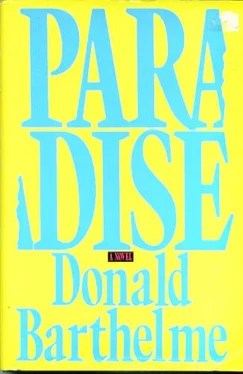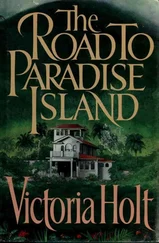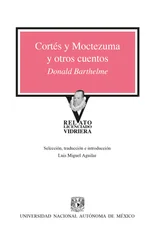The poet lives in the country, in an old Putnam County farmhouse that she has not touched except to paint the walls pale blue. She has painted over the old wallpaper, and the walls puff and wrinkle in places. The furniture is junk golden oak, one piece to a room except in the kitchen, where there is a table and two mismatched chairs. “This one is Biedermeier,” the poet says, “from my mother, and the other, the potato-chip jobbie, is Eames, from my father. That tell you anything?”
Simon takes the train from Grand Central to Putnam County. He doesn’t like the train, almost always in miserable repair and without air conditioning, and he hates changing at Croton, the rush from one train to another more like a stampede than anything else, but the views of the stately Hudson from the discolored windows are wonderful, and when he alights at Garrison at the end of this trip she is sitting on the hood of her circus-red Toyota pickup, drinking apple juice from a paper cup.
The poet sings to him:
Row, row, row your bed
Gently down the stream…
The professional whistler’s wife calls and says that if the resident bitches and tarts don’t keep their hands off her husband she will cause a tragic happenstance.
“Sounded a little pissed,” Anne says.
“These housewives,” says Veronica, “I guess you can’t blame them they don’t have the latitude.”
Dore says, “Let her come around, her ass is grass.”
“Simon is passive.”
“I don’t think he’s so passive he grasps you very tightly. I think the quality of the embrace is important.”
“I think he’s more active than passive. I’m still sore. I don’t call that passive.”
“He’s at a strange place in his life.”
“You’re like one of those people who have tiny little insights of no consequence.”
“The hell you say.”
“You’re like one of those people who have weird figurative growths on their minds that come out in dismal exfoliations.”
“You’re funnin’ me.”
“You’re like one of those people who don’t know their ass from their elbow.”
“Well there’s no need to be vulgar.”
“Yes there is.”
“Who says?”
“I say.”
“Well there’s no need to be vulgar.”
“You want one?”
“One what?”
“Bang.”
“What’s it got on it?”
“Sprinkles.”
“Naw I’m not decadent.”
“He’s slender.”
“You call that slender?”
“I except the paunch.”
“He can go maybe eighteen times in a good month.”
“That’s depressing.”
“I think it’s depressing.”
“I really want to be more vulgar than I am at present being.”
“Well who the fuck’s stopping you?”
“I guess nobody.”
“I guess we could dance cheek-to-cheek.”
“I guess we could tear up some little bunches of violets.”
“Well there’s no need to be destructive.”
“We pretend to be okay.”
“I’m fine. I’m really fine.”
“I was fine. Spent a lot of time on it, buffing the heels with one of those rocks they sell in the drugstore, oiling the carcass with precious oils — Then I found out. How they exploit us and reduce us to nothing. Mere knitters.”
“How’d you find out?”
“Read it in a feminist text.”
“I heard they’re not gonna let us read any more books.”
“Where’d you hear that?”
“Just around. On the Rialto.”
“Maybe it would be better for us so we wouldn’t be so exacerbated.”
“You’re like one of those people who lay down the flag in the dirt before it’s time.”
“Well that’s what you say you fool.”
“I want the car of my dreams.”
“What is it?”
“Camaro.”
“You’re like one of those people who have really shitty dreams, know what I mean? Really shitty dreams.”
“How can you say that?”
“I played in a band once.”
“What was your instrument?”
“Tambourine.”
“Can’t get a union card for tambourine.”
“My knee all black and blue, I banged my tambourine on it. First the elbow, then the knee.”
“I saw a beautiful ass. In a picture. It was white and was walking away from the camera. She was holding hands with a man. He was naked too it was a beautiful picture.”
“How’d that make you feel?”
“Inferior.”
“Well that’s what you say you idiot.”
“I’d like to light up a child’s life. I apologize I was wrong.”
“Yes you were wrong.”
“But I still think what I think.”
“It’s hard to get a scrape when you want to light up a child’s life.”
“I’ve done it three times.”
“Leaves you heavy of heart.”’
“It does.”
A: I’ve crossed both major oceans by ship, the Pacific twice, on troopships, the Atlantic once, on a passenger liner. You stand out there, at the rail, at dusk, and the sea is limitless, water in every direction, never-ending, you think water forever, the movement of the ship seems slow but also seems inexorable, you feel you will be moving, this way forever, the Pacific is about seventy million square miles, about one-third of the earth’s surface, the ship might be making twenty knots, I’m eating oranges because that’s all I can keep down, twelve days of it with young soldiers all around, half of them seasick — On the Queen Mary, in tourist class, we got rather good food, there was a guy assigned to our table who had known Paderewski, the great pianist who was also Prime Minister of Poland, he talked about Paderewski for four days, an ocean of anecdotes —
Q: I was tempted to become a shrink. But then I decided it wasn’t science.
A: But what if she stabs me in the ear with the scissors?
Q: Haven’t you realized that she is not going to stab you in the ear with the scissors?
A: A lot of people go along assuming that. And then they get stabbed in the ear with the scissors.
Q: You saw yourself, in relation to the three women, as an artist working in fat.
A: No no no.
Q: I’m a doctor. You can tell me. I’m used to hearing terrible things.
A: I felt blessed.
Q: Your hands are trembling.
A: That happens in the mornings sometimes.
Q: Which one was the best?
A: All lovely, all.
Q: I don’t have a clear idea of what these women looked like.
A: Dore had a scar. Right on the cheekbone, parallel to it. A good inch-and-a-half. About as thick as a pencil line, but white. Her hair was what they call ash-blond; she had black eyebrows. Veronica was blond too, a blonder blond. Very good forehead. Wore a ponytail a lot of the time. Anne had dark hair, very long. She had the longest hair.
Q: Did you feel, when you went out on the street with one of them, or to the market, that you looked strange together?
A: Never occurred to me.
Q: You do wear young clothes, youngish wretched clothes, garb of the youth culture slightly misunderstood —
A: Nothing the matter with my clothes. I’ve always worn these clothes.
Q: You see clients in those clothes?
A: Of course not. I put on a jacket and tie and —
Q: Harris tweed, a blue chambray shirt, dark-red tie of rough wool —
A: It’s a uniform, yes.
Q: I’m greatly comforted. I don’t like to think of people not wearing their uniforms, out of uniform.
A: Nor do the clients.
Q: Bellies. I’ve always been greatly drawn to the female belly, as a more subtle, less overt, sculptural representation of all the other tactile values we associate with —
A: All sculpture is about women, if you care to look at it that way. Buildings are about women, cars are about women, landscape is about women, and tombs are about women. If you care to look at it that way. The Grand Canyon.
Читать дальше












